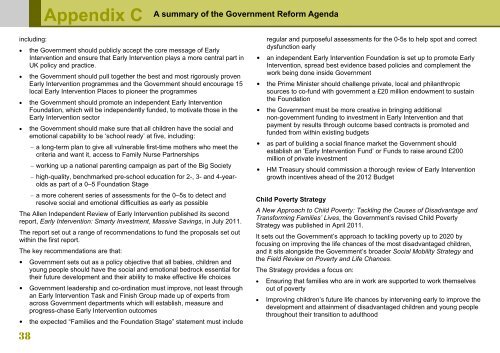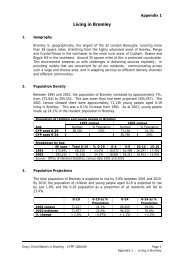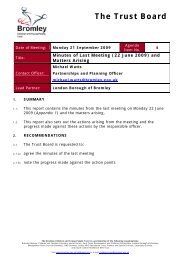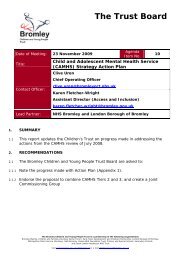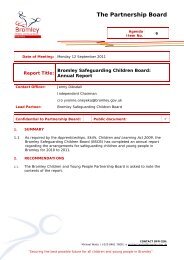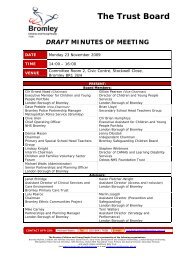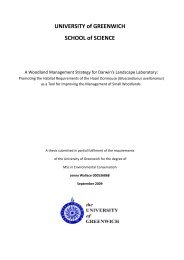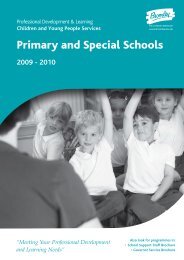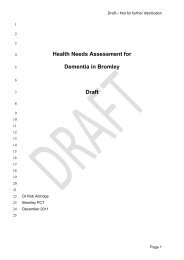LBB Children and Young People Services Portfolio Plan for 2011-12
LBB Children and Young People Services Portfolio Plan for 2011-12
LBB Children and Young People Services Portfolio Plan for 2011-12
Create successful ePaper yourself
Turn your PDF publications into a flip-book with our unique Google optimized e-Paper software.
Appendix C<br />
A summary of the Government Re<strong>for</strong>m Agenda<br />
including:<br />
• the Government should publicly accept the core message of Early<br />
Intervention <strong>and</strong> ensure that Early Intervention plays a more central part in<br />
UK policy <strong>and</strong> practice.<br />
• the Government should pull together the best <strong>and</strong> most rigorously proven<br />
Early Intervention programmes <strong>and</strong> the Government should encourage 15<br />
local Early Intervention Places to pioneer the programmes<br />
• the Government should promote an independent Early Intervention<br />
Foundation, which will be independently funded, to motivate those in the<br />
Early Intervention sector<br />
• the Government should make sure that all children have the social <strong>and</strong><br />
emotional capability to be ‘school ready’ at five, including:<br />
38<br />
− a long-term plan to give all vulnerable first-time mothers who meet the<br />
criteria <strong>and</strong> want it, access to Family Nurse Partnerships<br />
− working up a national parenting campaign as part of the Big Society<br />
− high-quality, benchmarked pre-school education <strong>for</strong> 2-, 3- <strong>and</strong> 4-yearolds<br />
as part of a 0–5 Foundation Stage<br />
− a more coherent series of assessments <strong>for</strong> the 0–5s to detect <strong>and</strong><br />
resolve social <strong>and</strong> emotional difficulties as early as possible<br />
The Allen Independent Review of Early Intervention published its second<br />
report, Early Intervention: Smarty Investment, Massive Savings, in July <strong>2011</strong>.<br />
The report set out a range of recommendations to fund the proposals set out<br />
within the first report.<br />
The key recommendations are that:<br />
• Government sets out as a policy objective that all babies, children <strong>and</strong><br />
young people should have the social <strong>and</strong> emotional bedrock essential <strong>for</strong><br />
their future development <strong>and</strong> their ability to make effective life choices<br />
• Government leadership <strong>and</strong> co-ordination must improve, not least through<br />
an Early Intervention Task <strong>and</strong> Finish Group made up of experts from<br />
across Government departments which will establish, measure <strong>and</strong><br />
progress-chase Early Intervention outcomes<br />
• the expected “Families <strong>and</strong> the Foundation Stage” statement must include<br />
regular <strong>and</strong> purposeful assessments <strong>for</strong> the 0-5s to help spot <strong>and</strong> correct<br />
dysfunction early<br />
• an independent Early Intervention Foundation is set up to promote Early<br />
Intervention, spread best evidence based policies <strong>and</strong> complement the<br />
work being done inside Government<br />
• the Prime Minister should challenge private, local <strong>and</strong> philanthropic<br />
sources to co-fund with government a £20 million endowment to sustain<br />
the Foundation<br />
• the Government must be more creative in bringing additional<br />
non-government funding to investment in Early Intervention <strong>and</strong> that<br />
payment by results through outcome based contracts is promoted <strong>and</strong><br />
funded from within existing budgets<br />
• as part of building a social finance market the Government should<br />
establish an ‘Early Intervention Fund’ or Funds to raise around £200<br />
million of private investment<br />
• HM Treasury should commission a thorough review of Early Intervention<br />
growth incentives ahead of the 20<strong>12</strong> Budget<br />
Child Poverty Strategy<br />
A New Approach to Child Poverty: Tackling the Causes of Disadvantage <strong>and</strong><br />
Trans<strong>for</strong>ming Families’ Lives, the Government’s revised Child Poverty<br />
Strategy was published in April <strong>2011</strong>.<br />
It sets out the Government’s approach to tackling poverty up to 2020 by<br />
focusing on improving the life chances of the most disadvantaged children,<br />
<strong>and</strong> it sits alongside the Government’s broader Social Mobility Strategy <strong>and</strong><br />
the Field Review on Poverty <strong>and</strong> Life Chances.<br />
The Strategy provides a focus on:<br />
• Ensuring that families who are in work are supported to work themselves<br />
out of poverty<br />
• Improving children’s future life chances by intervening early to improve the<br />
development <strong>and</strong> attainment of disadvantaged children <strong>and</strong> young people<br />
throughout their transition to adulthood


